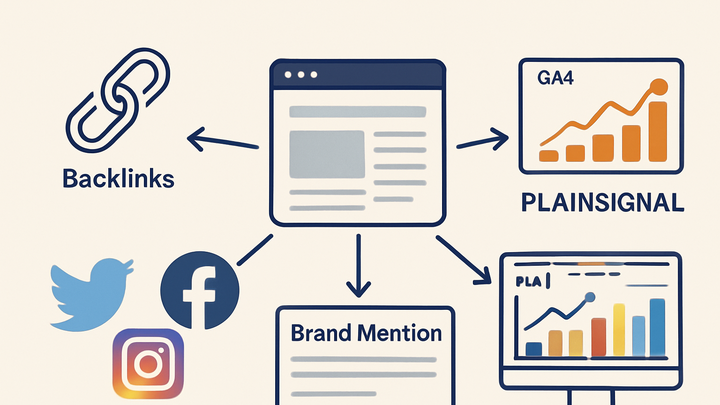Published on 2025-06-28T07:55:55Z
What is Off-Page SEO? Examples for Off-Page SEO
Off-Page SEO refers to all the optimization activities conducted outside of a website to improve its search engine rankings. While On-Page SEO focuses on content and technical elements within your site, Off-Page efforts signal trust, authority, and relevance to search engines through external endorsements. Common Off-Page strategies include building high-quality backlinks, engaging on social media, cultivating brand mentions in online publications, and participating in community forums. These external signals help search engines gauge your site’s credibility, influence, and popularity, ultimately driving more organic traffic. Off-Page SEO is an ongoing process that requires monitoring, outreach, and relationship-building with other authoritative websites and influencers. Integrating analytics tools like PlainSignal and Google Analytics 4 (GA4) enables marketers to track referral traffic, measure the impact of link-building campaigns, and refine their off-site strategy for maximum ROI.
Off-page seo
External SEO strategies like backlinks, social signals, and brand mentions that boost search rankings.
Why Off-Page SEO Matters
Off-Page SEO establishes your site’s credibility and trustworthiness with search engines by leveraging external endorsements. These signals influence your domain authority, improve your visibility in search results, and drive referral traffic. High-quality backlinks and social mentions act as votes of confidence, helping algorithms rank your content higher. By focusing on Off-Page factors, you differentiate your site from competitors and build a sustainable foundation for organic growth.
-
Search engine trust signals
Backlinks from reputable sites serve as endorsements, indicating to search engines that your content is valuable and authoritative.
-
Brand visibility and traffic
Engagement on external platforms like social media and publications increases referral traffic and raises brand awareness among potential customers.
Key Off-Page SEO Techniques
Effective Off-Page SEO relies on diverse strategies that earn authoritative links, social engagement, and brand recognition across the web. A balanced approach ensures long-term benefits and reduces the risk of algorithmic penalties.
-
Backlink building
Acquiring links from authoritative websites improves your domain authority and search visibility. Focus on obtaining links that are contextually relevant and come from credible sources.
-
Quality over quantity
Prioritize links from high-authority domains rather than amassing a large number of low-value links.
-
Diverse link profiles
Build links across different types of sites—blogs, news outlets, forums—to create a natural backlink profile.
-
Anchor text optimization
Use descriptive and varied anchor text to help search engines understand the context of your links.
-
-
Social media engagement
Encourage shares, likes, and mentions on social platforms to amplify your content’s reach and generate indirect SEO benefits through increased visibility.
-
Content sharing
Promote valuable content on social channels to attract traffic and potential backlinks.
-
Influencer outreach
Collaborate with influencers to extend your brand’s reach and earn authoritative mentions.
-
-
Brand mentions and pr
Earn unlinked brand mentions and press coverage through digital PR campaigns, which contribute to your site’s perceived authority even without direct backlinks.
Measuring Off-Page SEO Performance
Tracking and analyzing Off-Page SEO efforts is crucial to understand which strategies drive the most value. Leveraging analytics platforms helps you monitor referral traffic, evaluate backlink impact, and optimize outreach campaigns.
-
Tracking referral traffic with GA4
Use Google Analytics 4’s Acquisition reports to identify referral sources, assess the performance of backlinks, and track user behavior originating from external sites.
-
Monitoring referrers with PlainSignal
PlainSignal offers cookie-free analytics that clearly show referral domains and visitor patterns. Add this snippet to your site to start tracking:
<link rel="preconnect" href="//eu.plainsignal.com/" crossorigin /> <script defer data-do="yourwebsitedomain.com" data-id="0GQV1xmtzQQ" data-api="//eu.plainsignal.com" src="//cdn.plainsignal.com/plainsignal-min.js"></script>-
Integration example
Include the above code in the <head> section of your HTML to enable PlainSignal tracking on your domain.
-
-
Backlink quality analysis
Evaluate your backlinks using tools like Ahrefs, Moz, or SEMrush. Key metrics include domain authority, spam score, and link relevancy to ensure you maintain a healthy link profile.
